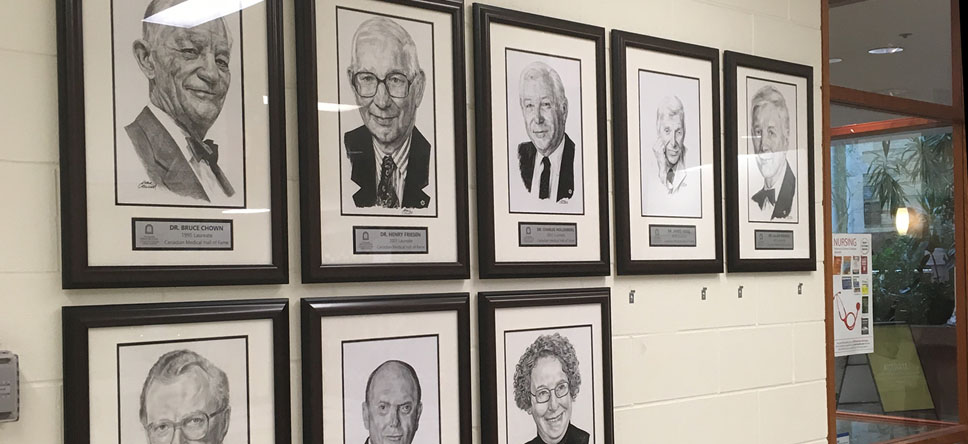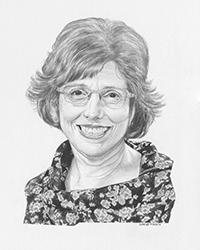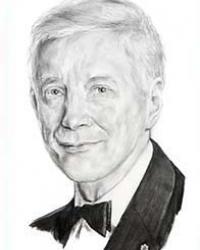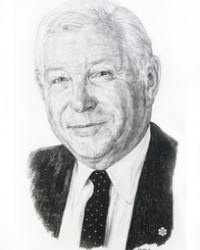
CMHF laureate portraits being installed on the first floor of the Brodie Atrium.
U of M alumni, faculty shine as Canadian Medical Hall of Fame laureates
Just in time for Homecoming 2018, Rady Faculty of Health Sciences has created a portrait wall in Brodie Atrium, honouring the women and men who have received the prestigious distinction of Canadian Medical Hall of Fame (CMHF) laureate.
To be inducted into CMHF, recipients must not only be exemplary scientists, but leaders whose work has led to extraordinary improvements in human health.
This distinction is awarded each year by the CMHF, based in London, Ont., to a select few who have pushed the boundaries of discovery and innovation.
The University of Manitoba is home to 10 such exceptional physicians, including two named just this year: Dr. Philip Berger, [MD/74] and Dr. Cheryl Rockman-Greenberg.
“These portraits are on now on permanent display for two important reasons,” said Dr. Brian Postl, dean, Rady Faculty of Health Sciences & vice-provost (Health Sciences). “First, we wish to honour these members of our community for their professional contributions. But equally, we want those who walk past the portraits every day to be inspired by the achievements of those who came before them and to strive to continue that tradition of excellence in health care.”
We encourage you to visit the new portrait wall, which is located on the main floor of Brodie adjacent to the bookstore.
Biographies of our CMHF laureates:
 2018 – Philip Berger [MD/74]
2018 – Philip Berger [MD/74]
Over a 40-year career, Dr. Philip Berger built a legacy of advocacy and activism fighting for health care for all people, regardless of their circumstances, and sometimes against powerful resistance. His achievements include founding the Toronto HIV Primary Care Physicians Group and leading high-profile campaigns to persuade government officials of the HIV prevention benefits of methadone and needle exchange programs.
He also co-founded and co-chaired Canadian Doctors for Refugee Care, leading the Federal Court of Canada Charter challenge restoring health coverage to about 100,000 refugees.
 2018 – Cheryl Rockman-Greenberg
2018 – Cheryl Rockman-Greenberg
U of M Distinguished Professor Dr. Cheryl Rockman-Greenberg, a renowned clinician scientist at the Children’s Hospital Research Institute of Manitoba, has advanced the global understanding of rare inherited disorders. Working closely with Manitoba communities she has developed diagnostic tests, screening programs and treatment for disorders that are over-represented in certain populations, notably hypophosphatasia, a bone disorder affecting Mennonite people, and glutaric aciduria type 1, a metabolic disorder affecting Oji-Cree people.
 2017 – Estelle Simons, [MD/69] FRCPC
2017 – Estelle Simons, [MD/69] FRCPC
Professor emerita Dr. Estelle Simons is internationally renowned for research on the pharmacologic management of allergic diseases, including anaphylaxis and asthma. Early in the allergy epidemic, she led an interdisciplinary team that conducted landmark investigations to establish the scientific basis for use of new medications that have since become safe and effective treatment for allergic diseases worldwide.
Her research focuses on development of a non-invasive epinephrine (adrenalin) formulation for treatment of anaphylactic episodes. With her colleagues, she is developing a rapidly-dissolving drug tablet that could be placed under a patient’s tongue.
 2013 – Arnold Naimark, OC, [MD/57]
2013 – Arnold Naimark, OC, [MD/57]
A builder, a leader, a pioneer – these are just some of the words used to describe the impact of Dr. Arnold Naimark.
Naimark received his medical degree at the U of M in 1957 and joined the faculty of medicine in 1963 as assistant professor. He rose quickly, soon becoming head of the medical department. In 1981, he was the appointed ninth president and vice-chancellor of the University of Manitoba. Under his transformative leadership, the university became known as one of Canada’s major academic health sciences institutions.
He is recognized for his work as one of the country’s foremost educational administrators and for his lifetime of work in the development of departments, universities, institutions and organizations at the local, provincial and national level.
 2012 – John Dirks, OC [MD/57]
2012 – John Dirks, OC [MD/57]
In a career now spanning five decades, Dr. Dirks has made huge impacts in every field he has touched, from scientific and academic achievements in nephrology to the promotion and advancement of excellence in medical research in Canada and around the globe.
Dirks was awarded the NFK International Medal by the National Kidney Foundation (USA) and the Roscoe Robinson Award by the International Society of Nephrology for his contribution to nephrology education.
 2011 – Allan Ronald, OC [MD/61]
2011 – Allan Ronald, OC [MD/61]
Dr. Allan Ronald, a pioneer of the University of Manitoba’s world-renowned infectious disease research program in Africa, is recognized for his tireless work in HIV/AIDS research. Much of his early work took place in an international setting, but his return to Winnipeg in 1968 set in motion the creation of the Manitoba Infectious Disease Program. It became internationally recognized, and has been acknowledged as Canada’s centre of excellence in the research and training of infectious diseases. As a mentor of young physicians, his limitless enthusiasm and dedication has ensured the advancement of Infectious Disease as a discipline.
In 2002, he retired from a 35-year career at the University of Manitoba but he has continued to foster the HIV/AIDS Care and Prevention Program in Uganda.
 2010 – James Hogg [MD/62]
2010 – James Hogg [MD/62]
Dr. James Hogg’s career researching and studying pathology, pulmonary physiology and molecular biology has had a tremendous influence on the world’s understanding of lung disease. Hogg’s research and studies advanced knowledge of how the lung works in health and disease as well as the pathophysiology of asthma and the harmful effects of smoking and pollution.
An outstanding researcher, teacher, lecturer and colleague, many say that Hogg has had a greater influence on the medical community’s knowledge of Chronic Obstructive Pulmonary Disease (COPD) and asthma than any other individual worldwide.
 2003 – Charles Hollenberg [MD/55]
2003 – Charles Hollenberg [MD/55]
Dr. Charles Hollenberg’s academic career in the 1960s, where he carried out research in fat metabolism and promoted the growth of scientific medicine at the Montreal General Hospital. From 1970 to 1981 he was the Chairman of the Department of Medicine at the University of Toronto, where he successfully furthered their goals in teaching and research.
In 1991, he accepted the position of President and CEO of the Ontario Cancer Treatment and Research Foundation (OCTRF), reinventing it as Cancer Care Ontario and Cancer Care International.
 2001 – Henry Friesen [MD/58]
2001 – Henry Friesen [MD/58]
Dr. Henry Friesen’s research on human growth hormone made successful replacement therapy in hormone-deficient children possible. Further endocrine research led to his isolation and purification of the hormone prolactin. In addition to this ground breaking work, Friesen developed the drug Bromocriptine in collaboration with researchers in the pharmaceutical industry, which proved to be effective in the treatment of infertility in women.
 1995 – Bruce Chown, OC [MD/22]
1995 – Bruce Chown, OC [MD/22]
Dr. Bruce Chown is renowned for his research on Rh hemolytic disease of the newborn and the development of the Rh immune globulin, which saved the lives of hundreds of thousands of babies around the globe. Chown joined the Children’s Hospital as a pathologist and took on a number of teaching posts, including professor and head of the department of pediatrics at the University of Manitoba. He has been called “a true giant in the overlapping fields of pediatrics, obstetrics, hematology and blood banking” who virtually eradicated the scourge of Rh incompatibility.
Research at the University of Manitoba is partially supported by funding from the Government of Canada Research Support Fund.






